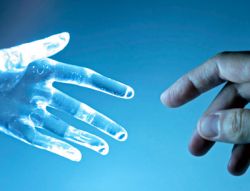
[2013-12-12] The sciences and the humanities look at the world from different perspectives. Now philosophers and physicists from Innsbruck, Austria, and Constance, Germany, will study the fundamentals of human actions together and hope to find new approaches for developing artificial intelligence. They are supported by the American Templeton Foundation with over one million Euro.
In the last few years, Hans Briegel has made ground-breaking proposals in quantum information theory. The physicist in Innsbruck is also addressing the question of the general limits and capabilities of computers, including adaptive and intelligent machines. For example, he studies the relevance of quantum physics for artificial intelligence, which addresses a very fundamental question: How can there be any room for creative thinking and acting when everything in the world at all scales seems to be governed and pre-determined by the laws of physics?
The question of how, in our modern scientific world view, we may establish a reasonable notion of action at all is also a major topic in philosophy. “There this issue is known under the concept of ‘agency‘, which could be translated as the capacity to act or the fundamental nature of action,” says Hans Briegel. “This concept includes the capacity of the agent to take action and control these actions.” Philosophical interest in the nature of human agency goes back to its beginnings and is still one of its central challenging topics. “In some ways, this question also refers to the very make-up of our modern scientific world view.”
Physics and philosophy
Thus, it was obvious for Hans Briegel to seek collaboration with philosophers. Now the question of agency will be studied in a unique project that brings together researchers of quantum physics and philosophy. In the next three years physicist Hans Briegel from the Institute of Quantum Optics and Quantum Information and the Institute for Theoretical Physics at the University of Innsbruck, philosopher Edmund Runggaldier of the Institute for Christian Philosophy Innsbruck and Thomas Müller, Professor of Theoretical Philosophy at the University of Constance, Germany will closely collaborate in this project. “We want to develop a kind of methods workshop where we combine models of analytical philosophy with modern concepts of theoretical physics and quantum theory. Philosophical approaches to agency will be tested and refined with explicit physical models and vice versa,” says Briegel. The physicist has recently proposed a first test case: Briegel has developed a model he calls projective simulation – a new stochastic model of intelligent agents that tries to reconcile our understanding of the laws of nature with the idea of free will and creative behaviour. The model is not meant to be an explanation of consciousness or a theory of how the brain works. “Rather it shows how the scope to act can indeed be realized and utilized in systems that are, at all scales, subject to the laws of physics.”
New models and concepts
Starting from their own discipline, philosophers and physicists will jointly address the possibility of agency in a world that is governed by the laws of nature. Hans Briegel and his team will explore the role of physics and, in particular, quantum physics, as a fundamental description of physical objects to develop a reasonable theory of agency. The researchers will ask how the concepts of quantum information processing could be used for developing new models of artificial intelligence. At the same time, they will be looking for a theoretical framework to conceptually describe artificial and natural agents, their power and identity. In addition, the researchers will investigate how the new findings can be connected to causation and intentionality.
“The premise in this project is that we work with well-founded concepts and methods from each of our disciplines and combine them in a way that hasn’t been done before,” says Hans Briegel, who is excited about this close, and in our time unusual, collaboration between the humanities and science.